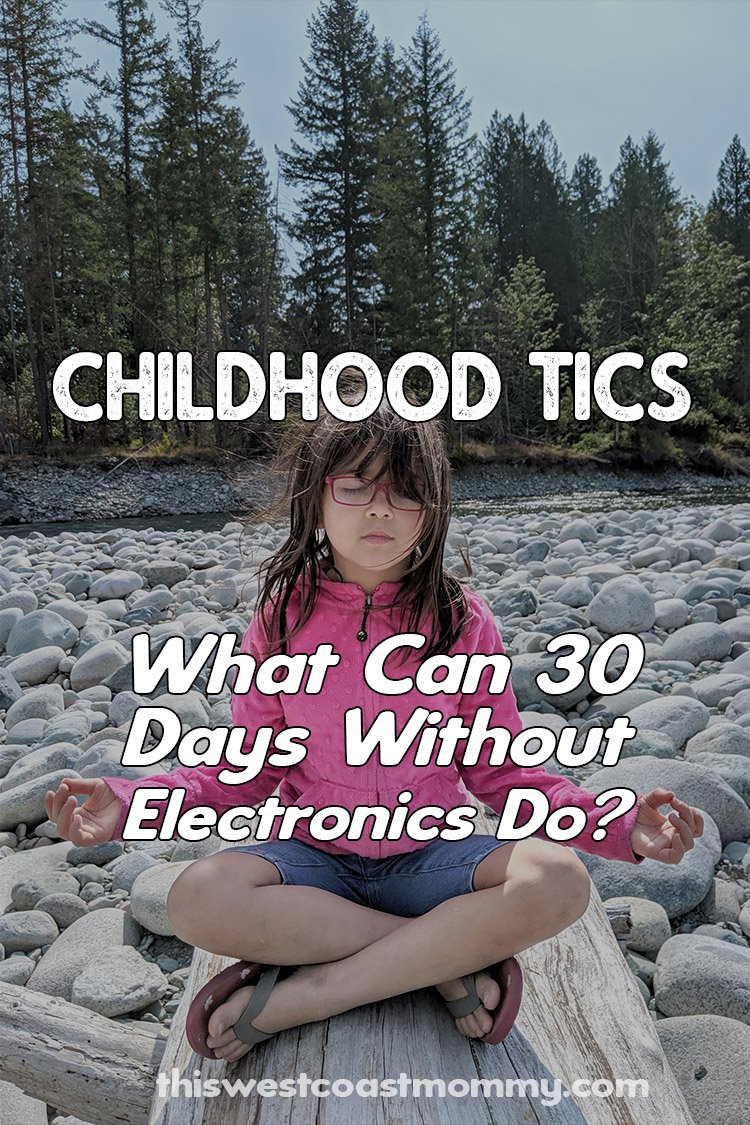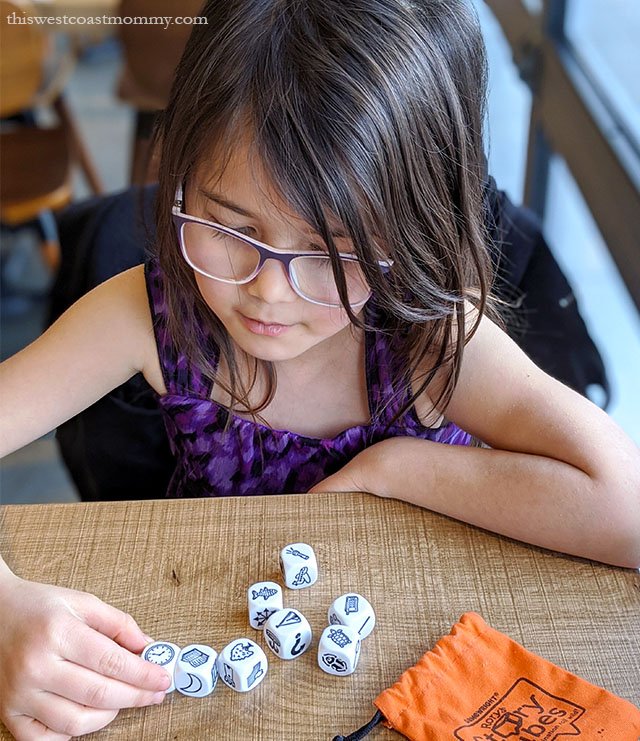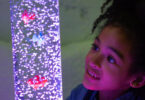Is your child living with tics?
Mine is.
This is the first time I’ve talked about this on the blog, because until now I didn’t have Kay’s permission. But now that she’s feeling in control of her body again, she’s given the go ahead for me to share her story and the intervention that helped her. She decided that if her story might help another kid like her, she wanted me to write about it.

Motor and verbal tics
It started with a cold and a sore throat two years ago in kindergarten. As you would expect with a cold, Kay was sniffling and coughing and clearing her throat a lot. A week, two weeks, three weeks later, and she was still clearing her throat despite not being sick anymore. And then I noticed her flicking her tongue out every time she cleared her throat. The throat clearing and tongue flicking kept getting louder and more frequent, and it was soon very apparent she couldn’t stop.
Kay saw an ear, nose, and throat specialist and had allergy testing done to check for any potential physical causes for the throat clearing. Testing found nothing, so we got a referral to a pediatrician who diagnosed her with transient tic disorder. Did you know that an estimated 10% of kids experience some kind of tic during childhood? It’s a lot more common than most people think. Fortunately, most kids outgrow their childhood tics without any treatment, so the pediatrician advised us to just ignore them as much as possible.
The first weeks after Kay’s diagnosis were pretty stressful for me. I cried a few times and tortured myself imagining worst case scenarios and all the ways that her tics might hold her back or negatively impact her life. But in reality, things went along reasonably well for a while.
The tongue thing faded away after a couple of months, and most of the kids in her kindergarten class didn’t seem to notice her throat clearing that much. She tried to do her tics quietly in the corner of the room, and she continued to play with all her friends like she had before. But it was always on my mind that things might be different once she started elementary school.
And then it was grade one in a new school. Kay’s Montessori class was made up of kids in grades one, two, and three, and the older kids definitely noticed. More than once, she came home upset and frustrated that her classmates told her to stop making noises and didn’t believe her when she told them she couldn’t.
With the support of her teacher, Kay practiced taking a walk, chewing gum, or having a drink of water to better manage her tics. Over the next few months, her throat clearing gradually got less frequent and slowly faded away. She was virtually tic-free for about four months and finished the school year feeling really good.

Old tics morphed into new tics
Unfortunately, near the beginning of summer, Kay started throat clearing again. Well, we had learned to live with it before and we could do it again, I thought. But within a couple of weeks her throat clearing morphed (as tics often do) into a new vocal tic. Instead of throat clearing, she began making a sort of squeaking noise.
At first it wasn’t that bad. It was only a few times a day and mostly under her breath. But it got louder and louder, and dramatically more frequent as the summer progressed. She got looks from passers by, and we stopped going to movie theatres and restaurants.
As August drew to an end and we neared the first day of school, I didn’t see how she could handle being in a regular classroom. By that time she was basically shrieking out loud as often as two or three times a minute. I was so scared that she would be bullied at school and ostracized from all her friends.
After scouring the internet for ideas, we stumbled over old forum posts from the early 2000s written by parents who had seen a difference in their children’s tics when they removed TV and video games. Of course back then, TV sets were mostly CRTs, a very different technology from today’s LED and LCD screens. Some parents speculated that it could be the refresh rate of those old CRT screens triggering tics, so we didn’t know if eliminating modern screens would help, but anything was worth trying.

Total ban on all screen time
We instituted a complete and total ban on all electronics and screens for 30 days. Zero screen time. None. Nada. Zip. Zilch. No TV, no computers, no tablets, no peeking at my phone.
We were lucky enough to have Kay’s cooperation for this. She was very self-conscious about her squeaking and knew that she would have problems in school if things continued as they had been. Of course she grumbled about not being allowed to watch TV, but when we reminded her why we were doing it she was able to see the reasoning. It helped that it was still summer so we spent a lot of time playing outside instead.
Within four days we started to notice a difference in the frequency of her tics, but they were still really loud. The first few days of school she did face annoyed looks and comments from her classmates. With the support of her teacher, my brave little girl stood up in front of the room and told her entire class of 20 children about tics and explained that she couldn’t help it, and that the more they paid attention to her tic, the more it would happen.
The longer Kay went without electronics, the better her tics got. By three weeks in, they were almost completely gone. She went from loud, disruptive shrieking literally hundreds of times a day down to four or five times a day. The electronics ban was so successful we extended it another month, and by early October she had stopped ticcing entirely.

Reintegrating screens back into daily life
But of course it’s pretty hard to live modern life with no screens whatsoever. TVs, tablets, laptops, and smart phones are everywhere, including in Kay’s classroom. To be honest, I was very nervous about reintroducing screens. The electronics “fast” had made such a big difference, I worried that her tics would come back the minute she watched TV again.
So we started very, very slowly. Kay’s class typically starts each school day with a short warm-up activity on the Go Noodle app. So we started by having her join the class for the morning activity (she had been going to the support room to colour instead). After a week of this and no sign of her tics, we allowed Kay to watch 30 minutes of TV on the weekend. We slowly increased her allowed screen time, paying very close attention to any signs of her tics coming back. So far they’ve stayed away completely, and it’s been such a relief for all of us.
Our current routine is no screen time at all during the week, but she gets a couple of hours of screen time and a movie night with the whole family on the weekend. Her tics haven’t come back, but we still limit her screen use just in case. Either way, it’s better for her to be reading, playing games, building LEGO, or playing outside than staring at a screen, so we’re good with keeping this schedule for now.

What’s the relationship between screens and tics?
We still don’t understand the exact relationship between electronics/screens and tics. One theory relates to dopamine, a neurotransmitter in the brain linked to motivation and motor control. Without getting into the complex neuroscience behind it, too much dopamine is associated with a host of disorders including tic disorders (like Tourette’s), obsessive compulsive disorder, and schizophrenia.
Along with other brain and genetic factors, tics are believed to be caused by overly sensitive dopamine receptors in certain parts of the brain. Since electronic media use increases the production of dopamine, removing screens may also help reduce dopaminergic activity and associated tics.
If your child is struggling with tics, try eliminating screen time for 30 days. I can’t say if you’ll have as much success as we’ve had, but compared to specialized therapy or medications that could have serious side effects, this is a simple intervention that produced almost miraculous results for my daughter. What do you have to lose?








Wow, this is fascinating! Please thank your daughter for being willing to share her story. While we have not dealt with tics, I have definitely noticed substantial behavioral differences related to the amount of screen time we have, and it’s usually pretty limited as it is. I have realized though, that when my daughter starts fighting bedtime, arguing, and not listening it’s time to put the screens away for a few days.
Very interesting. How is she doing today? We are experiencing similar issues but I think its season related. We also see an uptick in warmer months and a calm down in cooler months.
curious how she is doing now.
Amazing! I have huge concerns about the effect that screens have on humans in general but especially children. I think their use should be severely restricted for children. This just shows how sensitive children’s brains are to screens. A great article. Please thank Kay for allowing you to share her story!
This is so incredible and I’m so happy you found something that worked!
I’m not dealing with any tics but I am trying to limit screen time and have them earn it.. However, with a 5 year old, 3 year old, 1.5 year old, and one due in April, it is SO hard to get anything done without the TV. If I go to make lunch or clean the kitchen, I’ll turn around and the whole house will be a wreck without the distraction of a TV. Got any tips? Other than having them help, of course. We do that plenty but there are times when they just can’t.
I can totally believe that electronics can effect a kids brain and the way they behave and act. I am a firm believer that too much screen time is bad for them. I also believe that the first 3 years of their life is when its really important to not let them watch too much tv, or be on the ipad too much.
How is your daughter doing now? I hope she is doing OK? Are you still avoiding screens as much?
Just read your note about Kay and her tics, my daughter has a very similar path to Kays, she has TS and was diagnosed in 1st grade, she did the same as Kay and sat in the front the room explain to her peers what TS is and answered their many questions. Now my daughter is in 5th and distance learning, her tics have ramped up so much in just a week of online learning. Wondering how Kay is handling it or if you are homeschooling 100%? Ive prepared the teacher and set up my daughter with a 504 plan so we can easily adjust her learning structure but without using a computer it gets very tricky. Id love to try 30 days screen free!!
We actually didn’t see a recurrence of her tics with online learning this spring, but she’s just recently started some mild throat clearing so I’m removing screens again. I agree it’s a big challenge right now with online schooling and just the sheer amount of time the kids are spending at home. I hope you and your daughter can figure out a plan that works for her!
Thank you so much for sharing your story! I am about to pull my 9 year old off of video games due to vocal tics. I can’t do all screens since he is doing virtual school starting tomorrow. The tics have gotten constant and much worse during quarantine and longer use of the games. He is currently making this squeaking noise, almost like a noise from a game, and he can’t help it. He did have mild tics 2 times before. Very similar to your daughter it started with a cold, then the clearing of throat. This became constant and he added a little noise or a word in with it. It happened 2 years in a row, both times it stopped after a few months. He also developed them when I tried Claritin and Zyrtec for his allergies. The doctors say no but I know they caused the tics to come out. Once I stopped the meds (they weren’t taken at the same time) the tics went away. I am hoping that we can get them under control by stopping the video games.
I hope that removing those video games helps! Like you, it’s been a lot more difficult for us to reduce/remove screens right now due to remote learning and just the reality that the kids are home all the time. I’m having to remove “nonessential” screen time as well.
Hi Amy.
How did the conversation about stopping video games go? And how did your child react. I want to try this with my 8 year old. He plays till he goes to bed and plays right when he wakes up on the weekend
Hi Amy.
How did the conversation about stopping video games go? And how did your child react. I want to try this with my 8 year old. He plays till he goes to bed and plays right when he wakes up on the weekend..I think this could be the cause
Thank you for sharing this story. I’m a psychologist for adolescents, and in recent (last 6) years I have started to see more and more teens with tics. Interestingly, I have found the common denominator to be gaming/screen usage.
Thank you for this article. We’re in month 8 of quarantine and remote learning, heading into winter, and my 8 year old boy has started moving his face, grimacing and blinking hard almost all the time. I’m so worried and feel guilty wondering if its the combination of all online learning, video games, and T.V. We haven’t been able to get out and do the fun things we always did. I’m at the point where I am removing almost all screen time, even in times like this when he can’t do normal social activities. I’m also contacting his pediatrician for advice.
This is my exact situation my son is 8 and plays xbox as soon as he gets up on the weekends a0nd as soon as he gets home from school; till bedtime. He just started a new popping sound tic. He is an only child also…I believe the video games could be the cause. I am going to try and temporarily take his Xbox away. I know he is not going to like it
I have a child that has been ticking for 2 years it drives you out of your mind when you. can’t help them. I am going to start the eliminating screens after reading your comments I truly believe this is a key factor, we have tried every treatment available and only reducing stress has helped but I never thought about screen time. Thank you
I have a child that has been ticking for 2 years it drives you out of your mind when you. can’t help them. I am going to start the eliminating screens after reading your comments I truly believe this is a key factor, we have tried every treatment available and only reducing stress has helped but I never thought about screen time. Thank you
;a student is suffering a shoulder tic after playing on an x box console over the summer. i am trying to get the parents to ban the video screen but they are unconvinced. has anyone else experienced this. the child is a boy age 8.
i have been teaching for 51 years now and this is a first for me.
My 3 yr old started clearing her throat constantly last summer. I was convinced there was something wrong in our home (dust or mould) but after finding this article I realized that her screentime had increased by quite a bit due to the pandemic restrictions. Thankfully, after cutting back on the screentime, the throat clearing went away. Thanks so much for sharing your experience!
My 4 year old son started having tics after watching too much YouTube. His tics came in a form of blinking though. He would blink constantly, almost like fluttering of his eye lids rather than just normal blinking.
I took him to the opticians and they thought it may be a lazy eye but I noticed it would only happen when he watched the iPad for long periods of time. I’ve completely banned him from watching the iPad now and his tics have 99.9% disappeared. If hes very tired and is watching tv, I can see a tiny bit of his excessive blinking starting up but then I turn off the tv and put him to bed.
Before the blinking started he went threw a small stage of throat clearing but that only lasted a few weeks and then about 4 months later the blinking started up. I had no idea this was due to the ipad. He would watch cartoons and cute videos of baby animals.
Dont give young children iPads at all. Their too dangerous for them and leaves them frustrated and limits their imagination and they nolonger want to play with toys or make friends.
Hello everyone. This is not just for Amy its for a lot of people. I have struggled with tics since I was an infant. Although some of these studies about tech are true it may not always be. In fact I found that my tics decreased during online learning and started to get worse the less screen time I had. For me playing a video game or texting my friends is an escape from reality and it really helps me through my anxiety. So listen. Please don’t take all the tech away from your kids just because they started to rapid blink or something. I am not a doctor but your kid may not even have TS. They could be having anxiety tics so before you start to worry and take your kids tech away, make sure they are not just secretly suffering on the inside!!! And most of all, no matter what support your kids and love them unconditionally.
Ha yeah right
My son Joey’s tics are currently off the scale. So is tbe time he spends playing Roblox (or watching other people play Roblox) – there has got to be a correlation. Thank you so much for writing this, I’ll definitely be trying the screen ban. So happy for you and your daughter!
Hey Eric
Did you try and ban robots?
Thanks
Roblox
Did you try it? How’s it going?
We are going to try this. My son was diagnosed with moyamoya just over two years ago and had brain surgery to correct the blockages. He had motor tics prior to the surgery so we thought they were related. Soon after surgery the tics returned. Since summer started and he’s been on his iPad more, the tics have gotten progressively worse. We thought there had to be a connection. Your article makes a lot of sense so we are going to give it a shot.
Hi Amy.
How did the conversation about stopping video games go? And how did your child react. I want to try this with my 8 year old. He plays till he goes to bed and plays right when he wakes up on the weekend…
I am going to try this, just reduce hours in the beginning and slowly convince him to totally ban it. I promised my son thta I will not let him bore and he will get activities of his own choice to play. He cried first but then agreed let’s see.
Pray for us
I, have to question this now, as there’s a few things that I have to ask.
1. Have you considered that this may just be a case of operant conditioning? You are taking something away from the child, with the incentive that this is causing a ‘bad outcome’, therefore it makes psychological sense that child would be experiencing improved behavior, they are changing their behavior to appease the conditioning.
2. If an increase of screens cause a higher uptake of dopamine, then why isn’t everyone experiencing the tics/nervous symptoms? Everyone has been using devices more than ever thanks to the quarantine, and yet I don’t see more evidence over other people showing these tics.
3. If these tics are being increased by the increased dopamine, does that means that the child has some sort of condition from the beginning that causes these tics? As if the answer to Question 2 is something reasonable, that means this ‘solution’ is just treating the symptoms, not the cause.
I’m asking these because I want to understand your reasoning, as this seems to be something that is missing some possible context or reasoning. I don’t have anything against you or your daughter, I just want to understand why you believe that this is the solution towards it.
Thanks for reading.
https://www.newworldlibrary.com/ArticleDetails/tabid/230/ArticleID/339/Default.aspx#.YiZnnWRlDDs
Thank you for this article, we have started out 30 day screen free time yesterday, it was tough on all of us, 5 year old and 2 year old.
Any tips for Activities to do in the rain, we are currently telling the girls the internet is Brocken, as miss 5 doesn’t know or notice that she has been ticing. They do run in our family, but I believe they are being exaggerated by al the screen time during covid.
I am sorry that you have gone through this much.i believe that it will help me a lot.thank you so much
Curious- this article was written days before lockdown mandates, masking our children, and forcing them in front of screens for 6 hours a day 5 days a week for 2 years and some even until today. I’m not hearing about a pandemic of Tourettes or tics if screen time or dopamine is the actual cause. And here in the comments- not one person saying- yup- my kid is tic-ing full on from Covid screen mandates. Would be nice to hear how folks on here tried limiting screen time- but then were forced to increase screen time- how is your child’s tics? Anyone? Thank you.
It’s not quite the same thing, but I’ve seen this phenomenon in my own clinic since the pandemic started and thought this article was very interesting: https://health.clevelandclinic.org/tiktok-causing-tics-in-teen-girls/
My son’s tics became severe since covid lockdowns. He’s had the mild tics since he was 5, but since two years ago, his tics became persistent and eventually got diagnosed with Tourette. He was 10-11 yr old.
While I also suspected device time can exacerbate tics, I am not sure taking screen away is realistic. All of his school work is online. Google classroom, communicating with his classmates on group projects etc. it’s 2022, as much as I hate screen time, I also know he needs it for learning. I’m not sure what to do.
Hi Olivia! I’ve recently found this post after my 6 year old began throat clearing after having a cold. He’s been doing it daily for about 9 weeks now. He does it more frequently when he eats. Outside of eating, it’s very infrequent. In your case, do you find that the throat clearing tic is worse when eating? Also, I see your daughter was diagnosed with transient tics. Now that it’s gone beyond a year, has another diagnosis been made? Thank you for this post. I really needed a little peace of mind and this certainly helped. I’ll be limiting screen time beginning Monday. Do you find that limiting/not completely eliminating is helpful, as well? Thank you again!
Thank you very much!! My grandson is 9 he’s amazing! A few years ago he was diagnosed w Tourette’s. He plays a lot of Roblox Xbox, it’s too much I see it now!!
My son and his wife finally get it they need family counseling. They have to wean him off Xbox. He gets so mad and so angry. I need a support group just for me!! I keep trying to find one. Not so far I need it bad!
hi maam hows your daughter now? nov 2022. I hope she is doing well. my 6 yrs old son had tics before and we are doing zero screen time atleast in our house. or everytime we are with him. hes doing fine compared before.
There’s seems to be a real correlation between age of when the tics become an interruption. My Daughter is 9 and had a viral infection that then lead to a habit cough. I noticed tablet & tv made it go from a 4 to a 9 so we have eliminated it also have advised any homework online won’t be done. We’re going to start the 30 days very difficult as it’s Christmas season and films but health comes first we’ve swapped films for Christmas card making or ginger bread making. Radio is fine and audio Christmas books
I’m 36 now and have minor Tics ever since (and to be honest, they never stopped me from having an awesome life, a beautiful wife, 2 great kids, an awesome and well-paid job etc. – so don’t worry too much about your kids having Tics 🙂 They’ll be fine!). I also realize that electronics increase my tic-frequency – especially ‘exciting’ things, like exciting TV shows or morvies, gaming etc.; Unfortunately, I cannot reduce my ‘technical’ electronic use because of my job. However, I have reduced my office from 3 screens to 1 since 1-2 weeks, and I’m also using bluelight-filter-glasses since 1 week (as my current Tic is eye-blinking, which causes dry eyes…), and stopped watching TV in the evening since 1-2 weeks and reading books instead.
My Tics are not gone, but the frequency decreased, so it looks like a right way. Maybe – but just maybe – the bluelight-filter-glasses also have some affect on the Tics; So, could probably be worth a try for some of you to have their kids wear bluelight-filter-glasses when they cannot avoid using technical devices (e.g. when home schooling, doing homework on the computer, …). In the end, even if it doesn’t have a positive impact on their Tics, it could at least have a positive impatct on their eyes 🙂
I can’t promise it, but I plan to post an update here every once in a while about my progress (if it’s appreciated)
This is good to hear, wondering if the blue light glasses seem to still be working for you? My son is 14, has had the eye blinking since 7, it seems to flare up under stress and competition for him is basketball. He’s very involved in basketball. We’ve never had much issue with it, he’s told his friends when he was younger he had a tic disorder and it comes and goes. Now he’s on varsity teams and some of the parents and coaches are asking about the eye blinking, which just started up again he hasn’t had any of it in at least 6+ months. So it seems like it gets worse in the summer for some reason. Anyway, all that to say I wondered about the blue light glasses, maybe that would help him.
My daughter is dealing with both motor and verbal tics, mostly motor, since two years ago. She will be six in a couple of months. I was feeling hopeless looking at her twitch and blink. All of the online searches in the past for advice told me that it may fade away over time, and just ignore it. She recently told me she couldn’t control her own body. It seems like she feels the tics herself. This article gives me a glimmer of hope. I’ll definitely try it with her and post the update here. Thank you in advance.
hey, how is your daughter doing?
I would just like to say a massive Thankyou for posting this article , my son started ticing just under three weeks ago , I compleatly banned screen time for just under two weeks after reading this and his tic has compleatly gone! Monitoring time is our way forward, only half hour a day of gaming